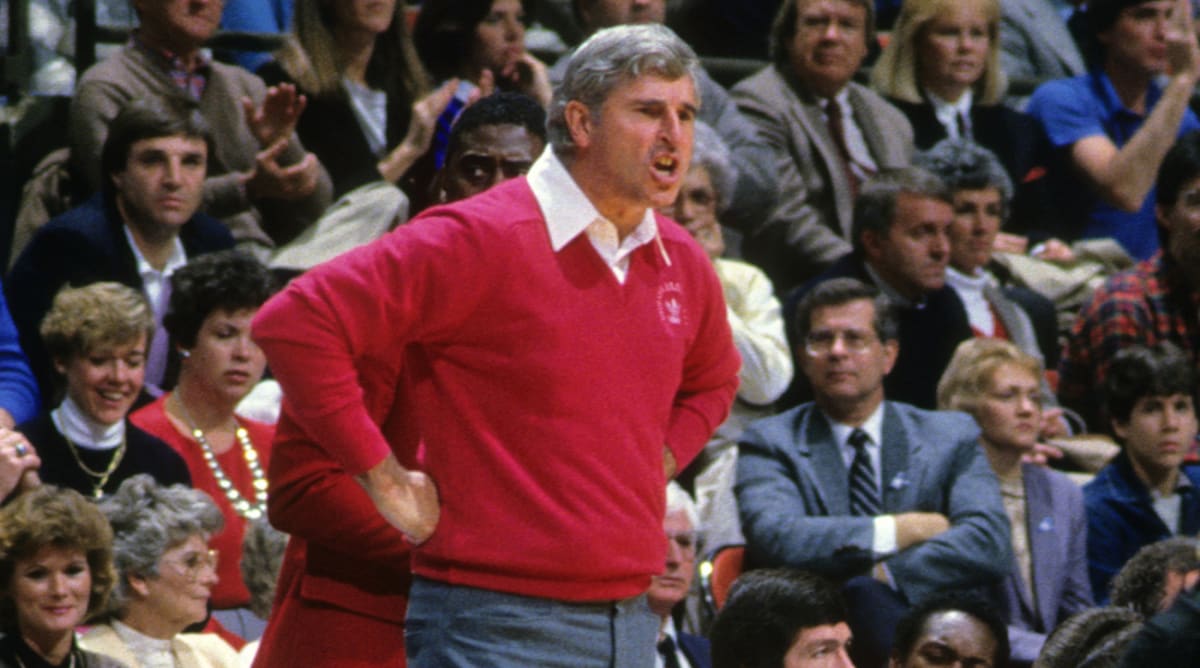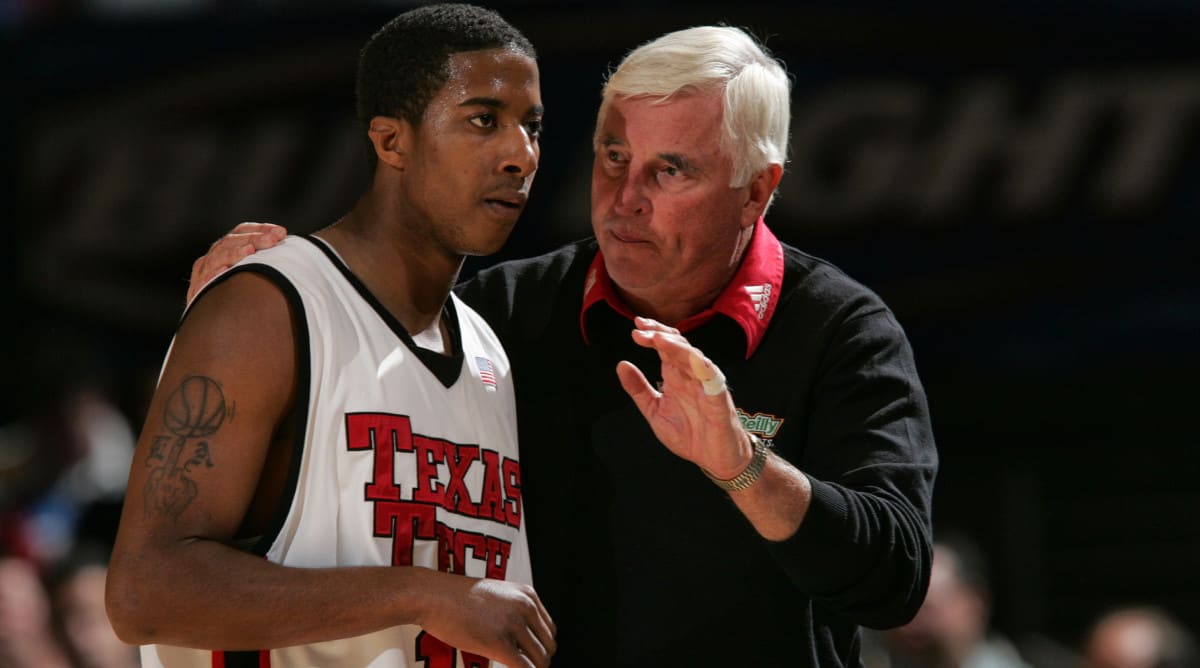My last sighting of Bob Knight provided a jarring reminder that time is undefeated. It was Feb. 8, 2020, and the stooped figure who shuffled haltingly into Assembly Hall bore scant resemblance to the intimidating icon I watched rule that basketball stronghold with an iron fist and molten temper.
Of all the feelings Knight sent surging through people over the course of decades, pity was never one of them. Until that day. The end was not at hand, but it was in sight.
Knight was 79 years old then, finally wooed back to Indiana University by his adoring former players. They had cajoled him into making peace with the school that fired him 20 years earlier. They wanted this moment for their old coach and for the fan base to show their appreciation for each other. They pushed for it to happen before it was too late, sensing the mutual need for catharsis and closure.
It was as if the entire state needed to hear those roars and to see that outpouring. Indiana needed to remind itself of all the strong emotions—good and bad—engendered by his man. They needed to feel it one more time.
“I don’t know if we’ll see something like this again in college basketball,” said Randy Wittman, who played on one of Knight’s three national championship teams, the 1981 version. Wittman was right, but not simply about the scene that day in Assembly Hall. We won’t see anything like Bob Knight again in college basketball. Nothing close.

John Iacono/Sports Illustrated
In some important ways, that’s good. Nobody can coach the way Knight did anymore, and nobody should. Knight’s brilliance was undercut by his mental and physical bullying of so many people around him, a flaw that led to his stunning dismissal at Indiana. Autocrats almost never go out on their own terms.
But we also will never see a coach of such giant proportion within his own realm. There have been many great college basketball coaches, but nobody was as singularly compelling as Knight. It wasn’t just the winning; it was the dogmatic belief in the way basketball should be played. And, by extension, it was the way that belief was consumed by those around him.
My first sports writing job was covering high school sports in Indiana, and the number of coaches at that level who worshiped at the Bob Knight Church of Man-to-Man Defense and Motion Offense was remarkable. True Believers were everywhere, mimicking everything down to the pregame warmup drills and snarling courtside demeanor. The tenets of that faith could not have been taken more devoutly if they were handed down on stone tablets.
After receiving a promotion to columnist at the Courier-Journal in Louisville, Kentucky, I covered Knight a lot. (The three primary beats at the paper then were Louisville, Kentucky and Indiana basketball, with the paper circulating widely across the lower half of Indiana.) There was nothing remotely similar to reporting on Knight in Assembly Hall, enthroned in his element, 17,000 people enthralled.
His aura was, to some, a way of life. That may sound weird and cultish, but it was also real. He came to stand for an unwavering commitment to ideals that were perceived to be under siege in some parts of Middle America. He was viewed in some locales as a last vestige of something slipping away.
But here was the counterfeit part of idolizing Knight as an exemplar of discipline and toughness: he rarely demanded discipline of himself the way he did his players, and toughness is never exemplified by punching down.
That was the dichotomy of Bob Knight. The easy way out is to call him “complicated.” While that word might ring true to a degree, I’d prefer to call him profoundly human. Most of us contain personality traits that are at odds, some we take pride in and others that shame us. His just seemed to be in larger proportion and intensity.

John Biever/Sports Illustrated
When so moved, Knight was the absolute best at coming into a postgame press conference and explaining what happened. He could dissect a stat sheet, offering insight into why a seemingly insignificant number affected the outcome. He often would profess admiration for an opposing player. He was a basketball genius who could articulate his insight. He was once trusting enough to let John Feinstein follow his team for a full season, writing one of the definitive books in the sports genre, Season On The Brink.
He also could be an unapologetic boor who had everyone walking on eggshells, hoping every night that it wasn’t their turn for a berating. I saw him once delight in offering a graphically off-color description of how he motivated one of his players at halftime, shocking a young female reporter sitting in the front row in the press room. That was sport to Knight.
When practice began the season after Knight’s dismissal, in October 2000 with Mike Davis as head coach, some longtime Indiana staffers were giddy. The atmosphere was so much lighter.
Amid the eternal tension between his many positive attributes and his roaring furnace of negative tendencies, the basketball his best teams played was sublime. The last undefeated team in men’s college basketball was Bob Knight’s 1975-76 squad, and he assuredly would have won the 1974-75 title as well if Scott May hadn’t broken his arm.
That season ended in a regional final with a 31–1 record, allowing John Wooden to win one last title at UCLA before retiring and turning the game over to his temperamental heir. Wooden was a native Hoosier who left, Knight was a transplant from Ohio, and their personalities were diametrically opposed—Wooden fancied himself an educator, while Knight’s nickname was “The General.”
Knight was just 35 years old when he won his first title, 41 when he won his second, 47 when he claimed his third. There could have—and probably should have—been more. But some of his inflexibility in times of change on and off the court might have curtailed that number. Instead, it was time for another heir—a more direct one, in terms of coaching tree—to ascend in former Knight assistant Mike Krzyzewski.
Coach K beat Knight in the 1992 Final Four, and Knight was curt to his pupil in the postgame handshake—something that began the erosion of their relationship. Krzyzewski and Duke went on to win their second straight national title two days later, and Knight never made the Final Four again. He coached eight more years at Indiana, then had seven successful seasons in basketball exile at Texas Tech, then went off to become a half-hearted TV analyst for several years.

Manny Millan/Sports Illustrated
Nobody saw or heard much of Knight after that, until he showed up in Assembly Hall in February 2020. The Knight who gingerly stepped back into Assembly Hall looked nothing like the raging, borderline unhinged man who strode toward me menacingly in the press room almost exactly 20 years earlier, on Jan. 18, 2000.
His Hoosiers had beaten Iowa in a great game that night, but the postgame press conference had devolved into a Knight philippic against the media for—in his mind—sensationalizing a rift between himself and Iowa coach Steve Alford, one of Knight’s all-time best players.
Knight had bellowed from behind a lectern in the room for a while, then stormed out, then stormed back in to yell one more thing at the media. It was then that I spoke up, reflexively questioning what Knight had said.
“Where’s the guy who asked that question?” Knight screamed.
“Right here,” I said, and at that point I was suddenly unsure whether to continue jotting down notes on what was happening or to drop my notepad and put up my fists. A physical confrontation was a few steps away.
It was then that Patrick Knight, Bob’s son, interceded and grabbed his father, pulling him out of the room. As Knight was leaving he shouted over his shoulder, “Some of you people need to find a better way to live!”
He could have—at times should have—delivered that advice to himself. But under the big tent of his conflicted persona, Bob Knight unapologetically lived his way and coached his way. We will never see another like him.







